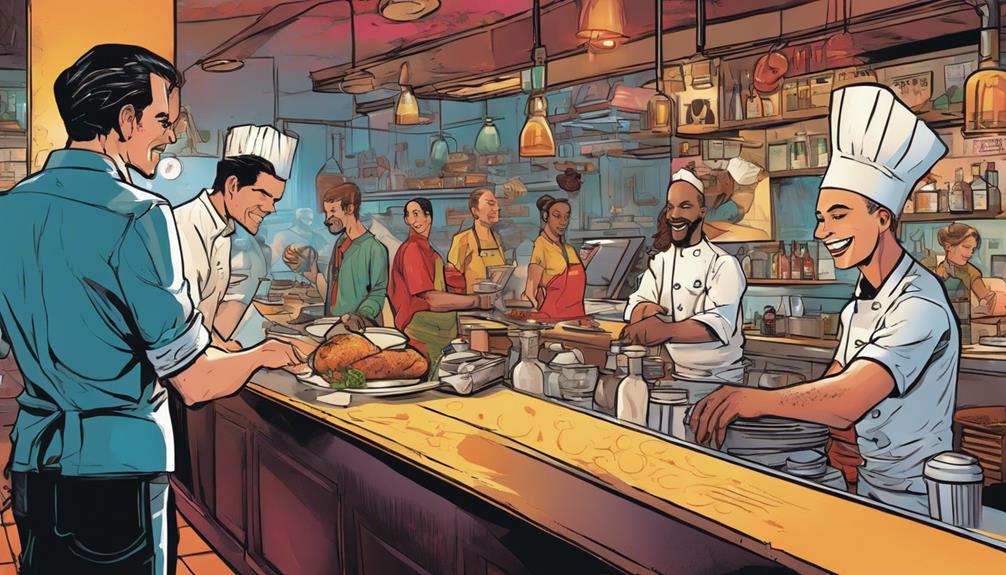In order for your restaurant to succeed, you must have a capable team in place. This includes having strong management to oversee operations and training. Your culinary team, consisting of creative chefs and skilled cooks, will enhance the quality of your menu and service. Service staff, such as servers, hosts, and buspersons, are crucial in ensuring customer satisfaction. Support staff like dishwashers and bartenders are essential to keeping everything running smoothly. It is important to hire the right people and encourage teamwork to boost morale and efficiency. By creating a united team, you will enhance the overall dining experience. Continue reading to discover more key strategies for a successful restaurant!
Key Takeaways
- A balanced team of chefs, cooks, servers, and support staff is essential for efficient restaurant operations and customer satisfaction.
- Hiring skilled culinary professionals enhances menu creativity and contributes to the restaurant's unique identity and reputation.
- Service staff, including servers and hosts, play crucial roles in delivering excellent customer experiences and managing reservations effectively.
- Support staff, such as dishwashers and bartenders, are vital for maintaining smooth operations during peak hours and enhancing the dining atmosphere.
Management and Operational Roles
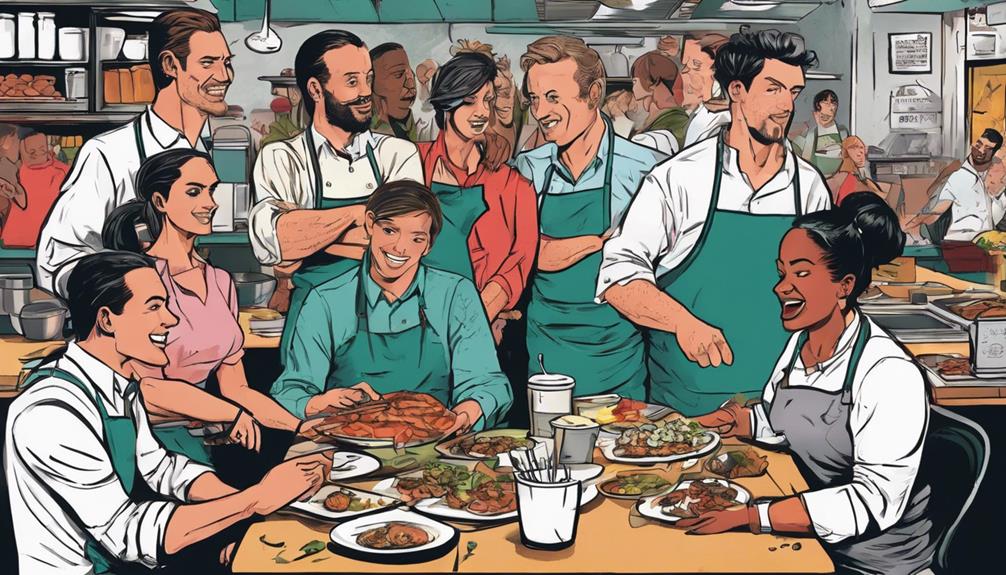
In any restaurant, management and operational roles drive the overall success and efficiency of daily operations. You play an essential role in ensuring everything runs smoothly.
As a manager, you oversee opening and closing tasks, track inventory, and train staff. Your experience—ideally three years in non-management and two in management—sets the stage for effective leadership.
Familiarity with local suppliers enhances your ability to meet customer needs. Your responsibilities also extend to marketing, which helps attract and retain clientele.
With median salaries around $42,387, seasoned managers can earn between $35,000 and $60,000, reflecting your expertise and commitment. Prioritizing these management roles ultimately leads to a thriving restaurant environment.
Importance of Hiring Strategies
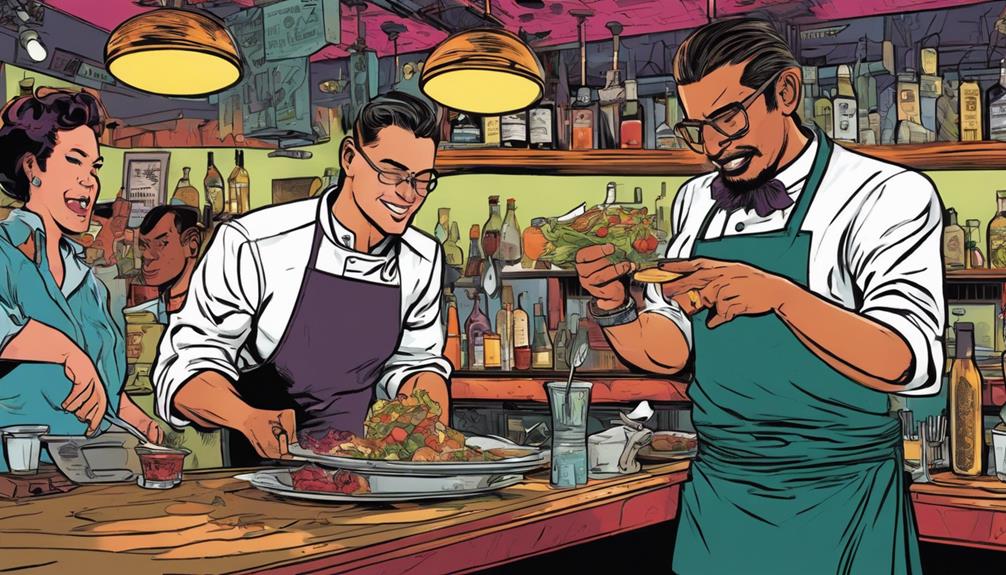
Effective hiring strategies are essential for building a skilled and motivated restaurant team that can enhance service quality and operational efficiency.
To achieve this, you should focus on candidates with relevant experience and strong interpersonal skills. Consider hiring part-time staff for peak service times to maintain efficiency without overwhelming your full-time employees.
Implementing thorough training programs will foster teamwork and improve service quality, ensuring your staff is always prepared to meet customer needs. Additionally, keep an eye on industry wage standards to attract and retain top talent.
Culinary Staff Contributions
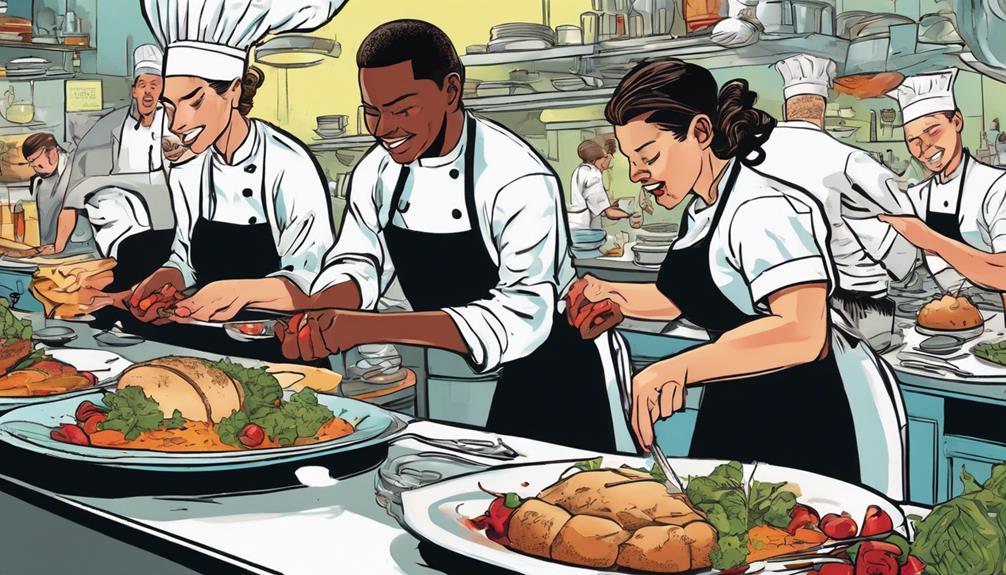
Hiring the right culinary staff can greatly elevate your restaurant's overall performance and customer satisfaction.
Skilled culinary professionals bring creativity and expertise to your menu, ensuring each dish meets high standards. When you hire passionate cooks and chefs, they contribute to your restaurant's unique identity, attracting repeat customers. Their knowledge of ingredients and techniques enhances food quality, which directly influences guest experiences.
Moreover, effective culinary staff collaborate seamlessly with servers and management, fostering a positive atmosphere in your kitchen.
This teamwork results in smoother service during busy periods, minimizing wait times and maximizing guest satisfaction. Investing in your culinary team pays off by driving your restaurant's success and reputation in the competitive dining landscape.
Role of Chefs and Cooks
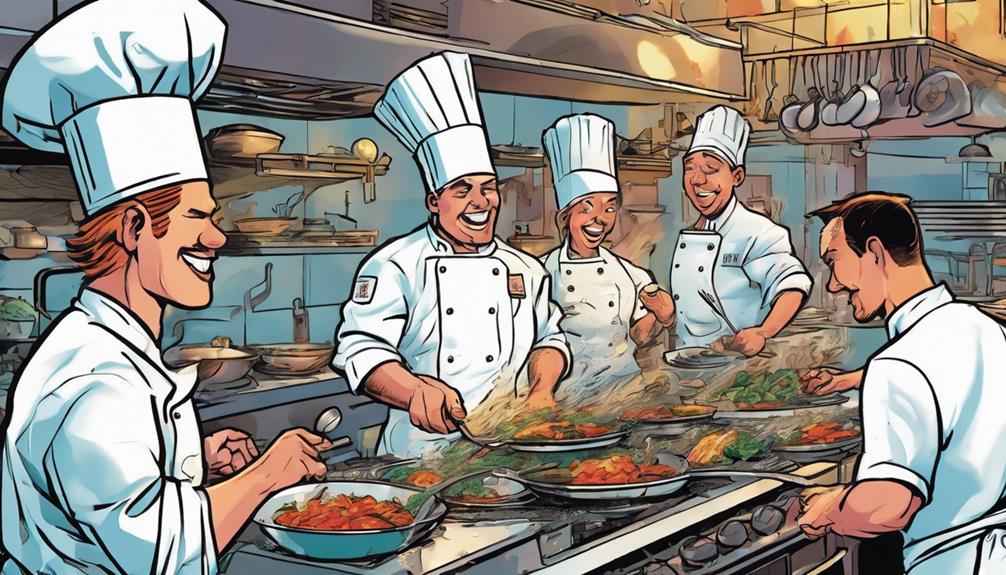
Chefs and cooks play an essential role in shaping your restaurant's culinary identity and guaranteeing high-quality dishes that keep customers coming back. Their expertise not only influences menu design but also enhances the overall dining experience.
Skilled chefs, whether executive or sous, lead your kitchen's operations, innovating recipes and maintaining consistency. Cooks, on the other hand, support by preparing ingredients and executing dishes according to the chef's vision.
You'll need a balanced team—full-time cooks for peak hours and part-time cooks during busy times. Hiring individuals with relevant experience guarantees a smooth workflow, while continuous training helps keep skills sharp.
Ultimately, your restaurant's reputation hinges on the creativity and dedication of your culinary staff.
Service Staff Responsibilities
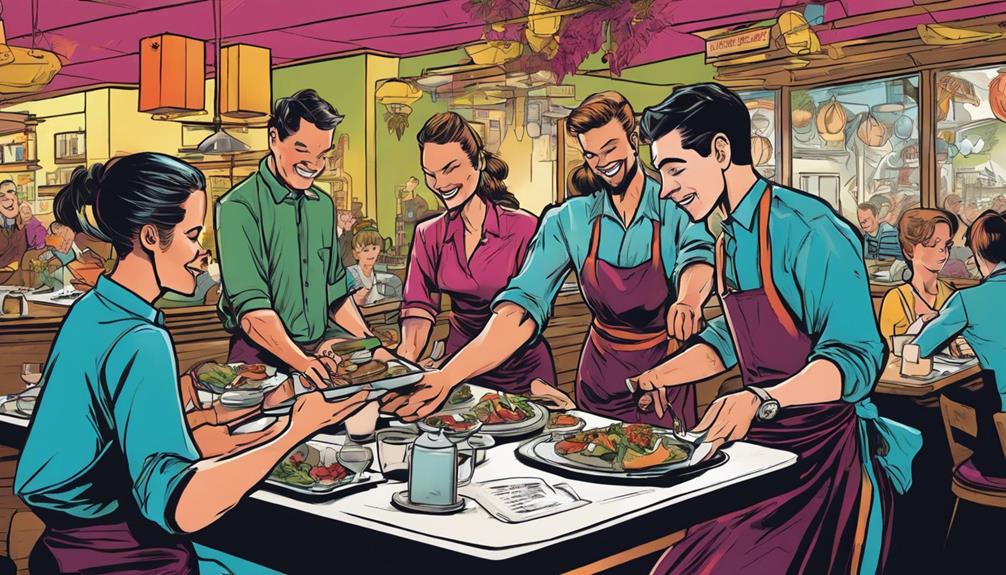
Service staff play an important role in creating memorable dining experiences by directly interacting with customers and making sure their needs are met promptly.
As a server, you'll take orders, recommend menu items, and deliver food and drinks efficiently. Your ability to maintain a positive demeanor, even during busy shifts, will greatly impact customer satisfaction.
Buspersons support you by clearing tables and refilling water glasses, allowing you to focus on your guests.
If you're a host, you'll manage reservations and greet patrons warmly, setting the tone for their visit.
It's vital to work collaboratively with your team, especially during peak hours, to guarantee smooth service.
Support Staff Essentials
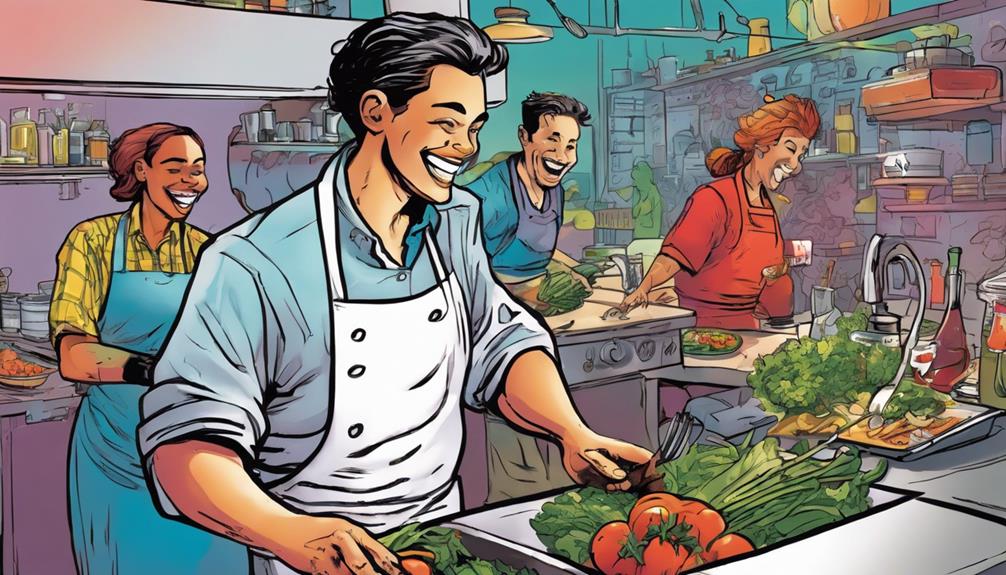
While service staff focus on customer interactions, support staff play an equally important role in ensuring the restaurant runs smoothly behind the scenes.
Dishwashers keep your kitchen running efficiently, handling the high volume of dishes and utensils necessary for daily operations.
Bartenders not only mix drinks but also manage inventory and create a lively atmosphere.
It's essential to hire enough support staff to cover peak hours, ensuring every area operates seamlessly.
Consider part-time positions for flexibility and cost-effectiveness.
By prioritizing training for these roles, you enhance teamwork and operational efficiency, which ultimately supports your service staff and delights your guests.
Investing in your support staff is investing in your restaurant's overall success.
Enhancing Team Dynamics
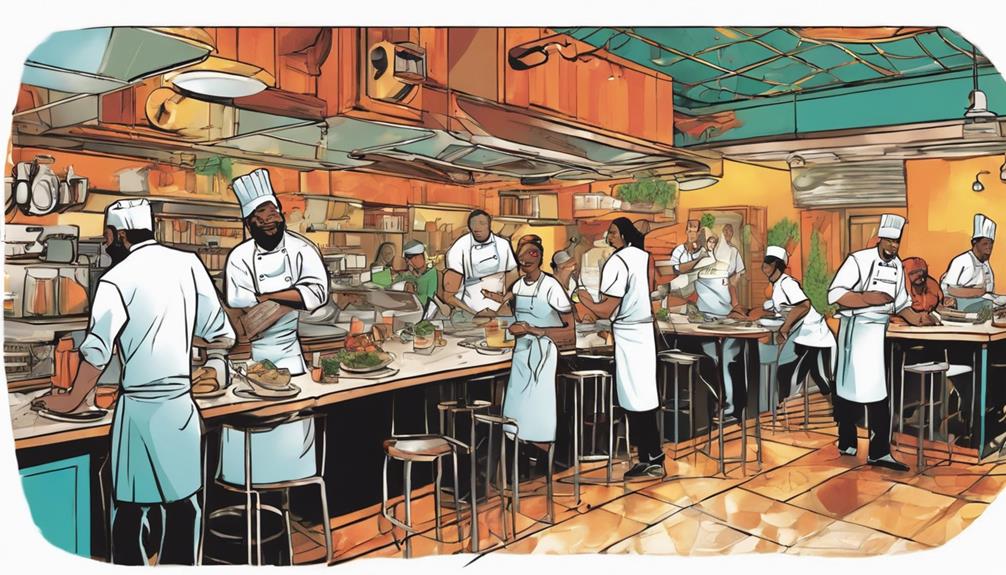
Fostering strong relationships among your restaurant staff boosts collaboration and enhances the overall dining experience for your guests. Encourage open communication and team-building activities to create a supportive environment. When your staff feels valued and connected, they'll work more efficiently together, leading to better service and happier customers.
| Team Roles | Collaboration Benefits |
|---|---|
| Servers | Quick information exchange |
| Buspersons | Efficient table turnover |
| Bartenders | Enhanced drink service |
| Chefs | Streamlined menu execution |
| Managers | Cohesive operational strategy |
Strategies for Staff Retention

Implementing effective staff retention strategies is essential for maintaining a motivated and skilled workforce in your restaurant.
Start by offering competitive wages and benefits that reflect the hard work your team puts in.
Foster a positive work environment where communication is encouraged, and feedback is valued.
Regularly recognize and reward your staff for their contributions to build loyalty and morale.
Provide opportunities for professional development through training and advancement, ensuring your employees feel invested in their careers.
Encourage team bonding activities to strengthen relationships among staff.
Finally, maintain flexibility in scheduling to accommodate personal needs, showing you care about their well-being.
Frequently Asked Questions
What Qualifications Should I Look for in a Restaurant Manager?
When hiring a restaurant manager, look for local experience, strong interpersonal skills, and at least three years in non-management and two years in management. They should also excel in inventory tracking, staff training, and marketing.
How Can I Effectively Train New Culinary Staff?
Think of your kitchen as a garden; nurture your culinary staff through hands-on training, mentorship, and clear expectations. Cultivate their skills with regular feedback, and watch them blossom into a cohesive, efficient team.
What Are the Common Challenges Faced by Serving Staff?
Serving staff often face challenges like managing high-pressure situations, balancing multiple tables, and ensuring customer satisfaction. You'll need to maintain a positive attitude, adapt quickly, and communicate effectively to overcome these hurdles successfully.
How Do I Determine Appropriate Wages for Support Staff?
So, you wanna pay your support staff, huh? Start by checking local wage standards, factoring in experience, and don't forget to sprinkle in some tips. Competitive wages keep them happy, or they might join the circus instead!
What Role Does Staff Diversity Play in Restaurant Success?
Staff diversity boosts restaurant success by fostering creativity and innovation. It attracts a broader customer base, enhances problem-solving, and improves team dynamics. Embracing different perspectives helps you create a more inclusive and appealing dining experience.
What Are Some Essential Staff Members for a Food Truck Business?
When starting a food truck business, essential staff members include a chef skilled in preparing a variety of dishes using essential food truck ingredients. An experienced driver who knows the best locations for parking and a friendly server to take orders and interact with customers are also key team members.
Conclusion
In the bustling world of restaurants, having the right team makes all the difference. By understanding each role's contribution, from management to culinary and service staff, you can create a well-oiled machine that delights customers.
Remember, a happy team leads to happy diners—after all, you wouldn't want your restaurant to be a ghost town!
So, invest in hiring, training, and retaining your staff, and watch your establishment thrive like a fine-tuned jazz band.
